International Business Report: WTO Analysis and Discussion
VerifiedAdded on 2022/12/22
|14
|3931
|64
Report
AI Summary
This report provides a comprehensive analysis of the World Trade Organization (WTO) within the context of international business. It begins with an executive summary and introduction, followed by a literature review exploring the motivations behind the WTO's formation, including political and economic factors, and its role in facilitating global trade. The report then delves into an analysis and discussion of the WTO's key functions, such as managing trade flows and resolving disputes, while also examining the challenges it faces. The analysis highlights the WTO's impact on various sectors and companies. The report concludes by summarizing the findings and providing a list of references and a bibliography.
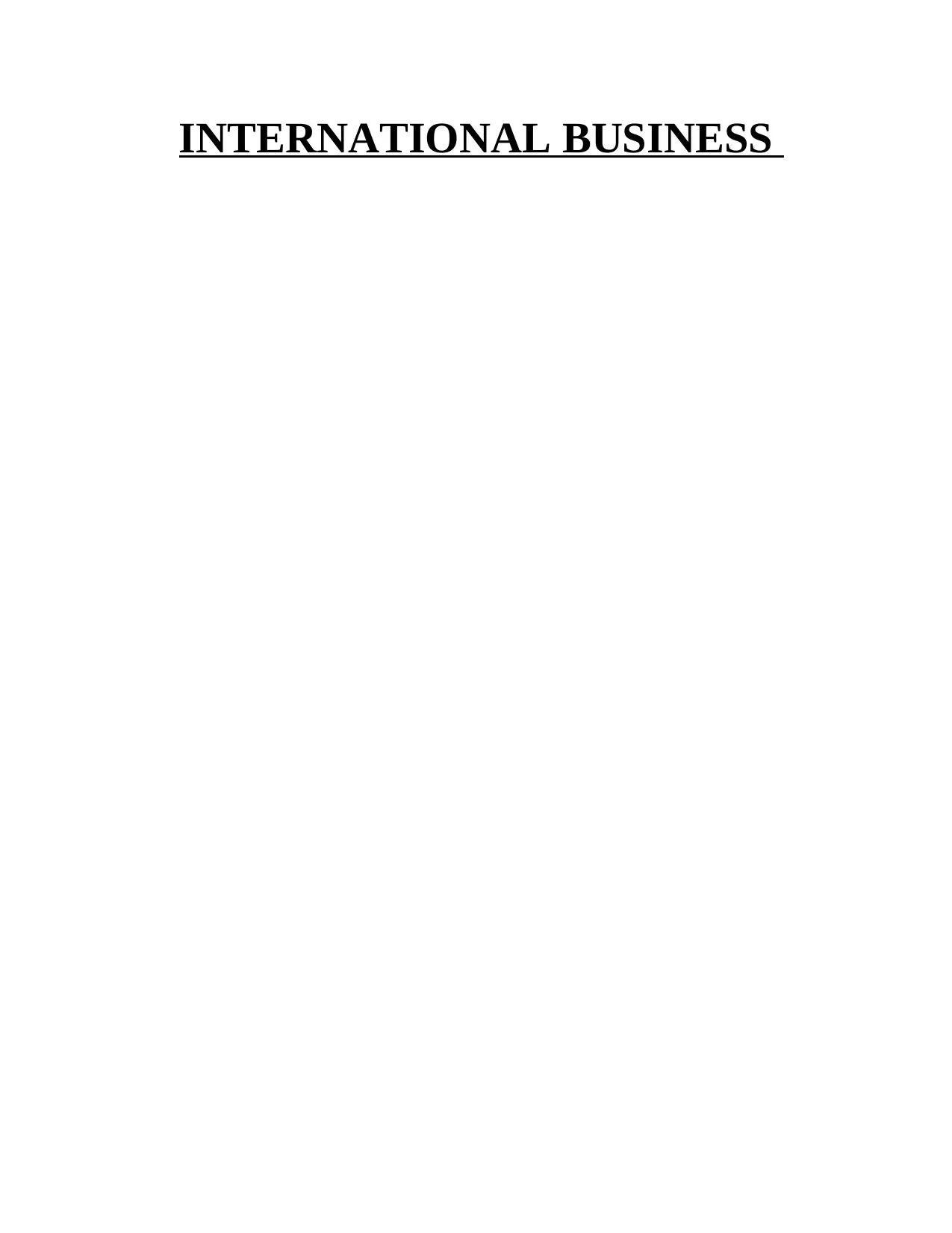
INTERNATIONAL BUSINESS
Paraphrase This Document
Need a fresh take? Get an instant paraphrase of this document with our AI Paraphraser
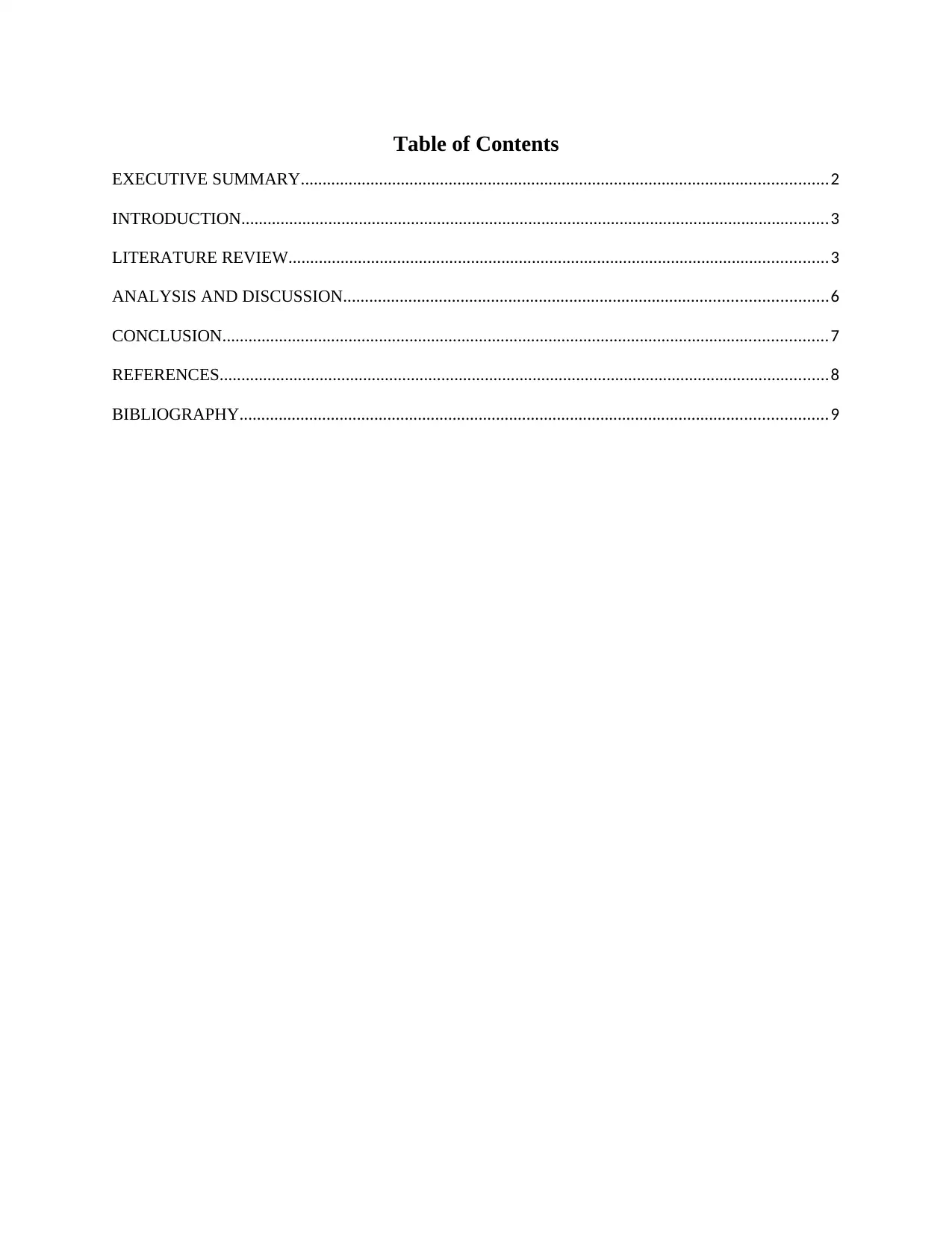
Table of Contents
EXECUTIVE SUMMARY.........................................................................................................................2
INTRODUCTION.......................................................................................................................................3
LITERATURE REVIEW............................................................................................................................3
ANALYSIS AND DISCUSSION...............................................................................................................6
CONCLUSION...........................................................................................................................................7
REFERENCES............................................................................................................................................8
BIBLIOGRAPHY.......................................................................................................................................9
EXECUTIVE SUMMARY.........................................................................................................................2
INTRODUCTION.......................................................................................................................................3
LITERATURE REVIEW............................................................................................................................3
ANALYSIS AND DISCUSSION...............................................................................................................6
CONCLUSION...........................................................................................................................................7
REFERENCES............................................................................................................................................8
BIBLIOGRAPHY.......................................................................................................................................9
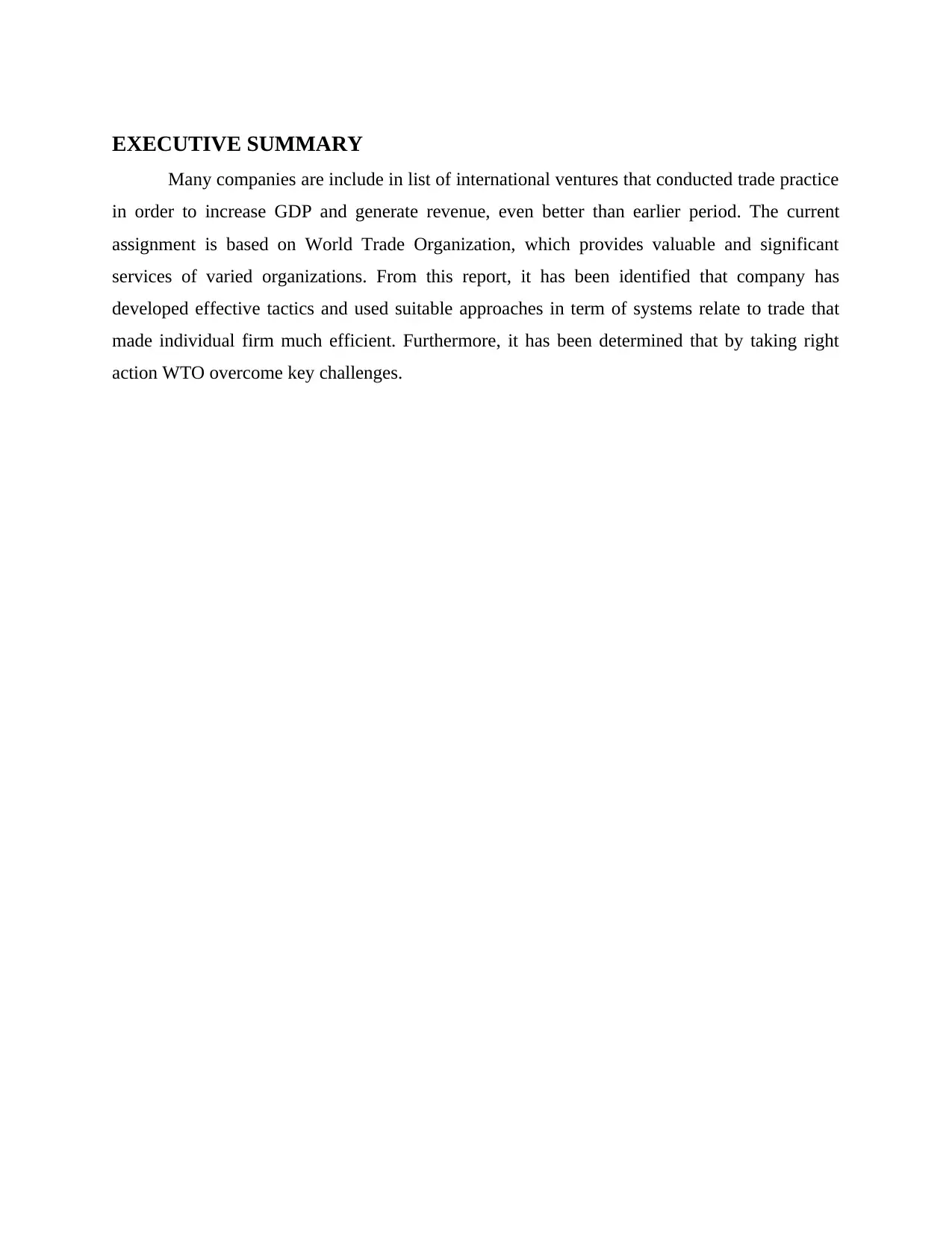
EXECUTIVE SUMMARY
Many companies are include in list of international ventures that conducted trade practice
in order to increase GDP and generate revenue, even better than earlier period. The current
assignment is based on World Trade Organization, which provides valuable and significant
services of varied organizations. From this report, it has been identified that company has
developed effective tactics and used suitable approaches in term of systems relate to trade that
made individual firm much efficient. Furthermore, it has been determined that by taking right
action WTO overcome key challenges.
Many companies are include in list of international ventures that conducted trade practice
in order to increase GDP and generate revenue, even better than earlier period. The current
assignment is based on World Trade Organization, which provides valuable and significant
services of varied organizations. From this report, it has been identified that company has
developed effective tactics and used suitable approaches in term of systems relate to trade that
made individual firm much efficient. Furthermore, it has been determined that by taking right
action WTO overcome key challenges.
⊘ This is a preview!⊘
Do you want full access?
Subscribe today to unlock all pages.

Trusted by 1+ million students worldwide
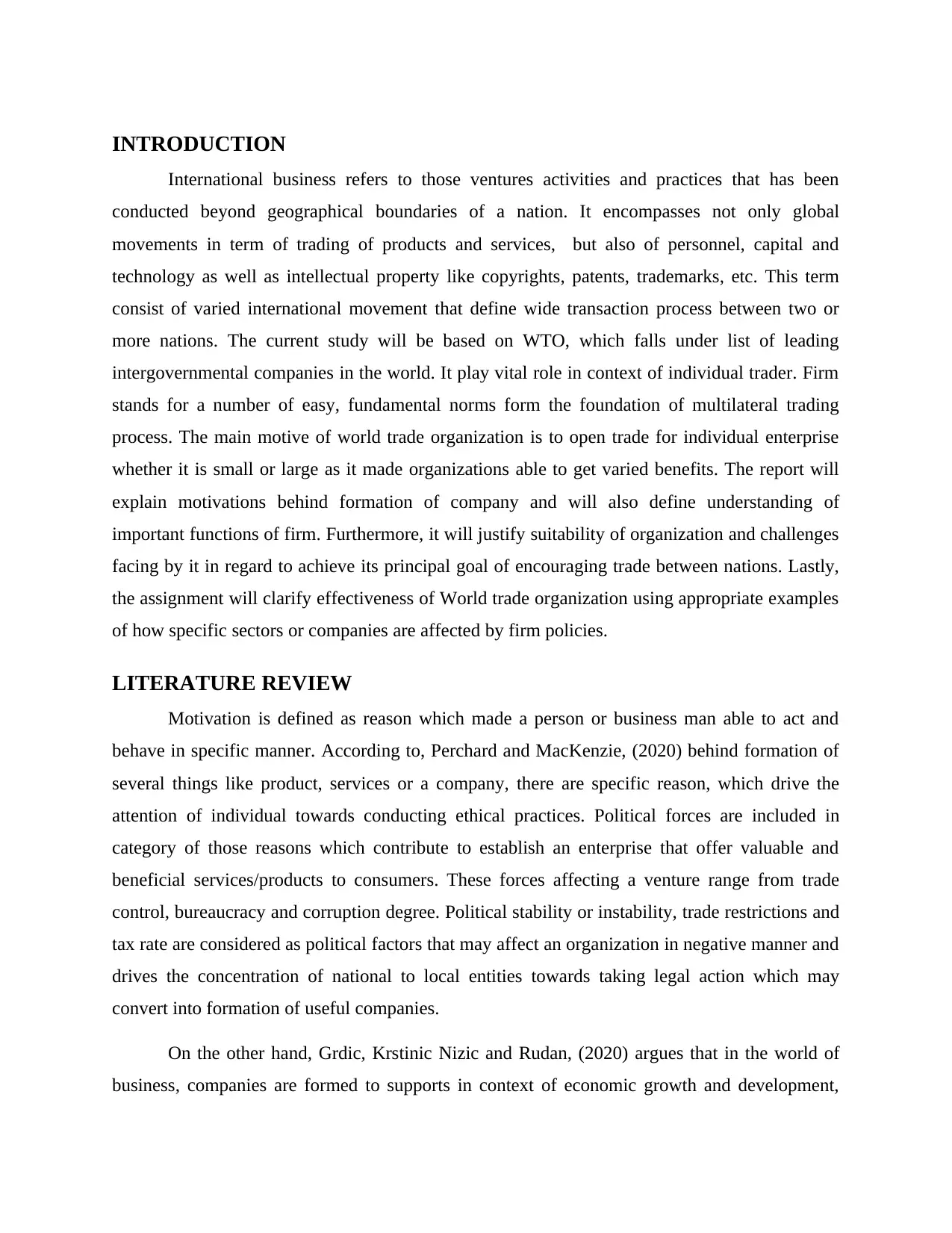
INTRODUCTION
International business refers to those ventures activities and practices that has been
conducted beyond geographical boundaries of a nation. It encompasses not only global
movements in term of trading of products and services, but also of personnel, capital and
technology as well as intellectual property like copyrights, patents, trademarks, etc. This term
consist of varied international movement that define wide transaction process between two or
more nations. The current study will be based on WTO, which falls under list of leading
intergovernmental companies in the world. It play vital role in context of individual trader. Firm
stands for a number of easy, fundamental norms form the foundation of multilateral trading
process. The main motive of world trade organization is to open trade for individual enterprise
whether it is small or large as it made organizations able to get varied benefits. The report will
explain motivations behind formation of company and will also define understanding of
important functions of firm. Furthermore, it will justify suitability of organization and challenges
facing by it in regard to achieve its principal goal of encouraging trade between nations. Lastly,
the assignment will clarify effectiveness of World trade organization using appropriate examples
of how specific sectors or companies are affected by firm policies.
LITERATURE REVIEW
Motivation is defined as reason which made a person or business man able to act and
behave in specific manner. According to, Perchard and MacKenzie, (2020) behind formation of
several things like product, services or a company, there are specific reason, which drive the
attention of individual towards conducting ethical practices. Political forces are included in
category of those reasons which contribute to establish an enterprise that offer valuable and
beneficial services/products to consumers. These forces affecting a venture range from trade
control, bureaucracy and corruption degree. Political stability or instability, trade restrictions and
tax rate are considered as political factors that may affect an organization in negative manner and
drives the concentration of national to local entities towards taking legal action which may
convert into formation of useful companies.
On the other hand, Grdic, Krstinic Nizic and Rudan, (2020) argues that in the world of
business, companies are formed to supports in context of economic growth and development,
International business refers to those ventures activities and practices that has been
conducted beyond geographical boundaries of a nation. It encompasses not only global
movements in term of trading of products and services, but also of personnel, capital and
technology as well as intellectual property like copyrights, patents, trademarks, etc. This term
consist of varied international movement that define wide transaction process between two or
more nations. The current study will be based on WTO, which falls under list of leading
intergovernmental companies in the world. It play vital role in context of individual trader. Firm
stands for a number of easy, fundamental norms form the foundation of multilateral trading
process. The main motive of world trade organization is to open trade for individual enterprise
whether it is small or large as it made organizations able to get varied benefits. The report will
explain motivations behind formation of company and will also define understanding of
important functions of firm. Furthermore, it will justify suitability of organization and challenges
facing by it in regard to achieve its principal goal of encouraging trade between nations. Lastly,
the assignment will clarify effectiveness of World trade organization using appropriate examples
of how specific sectors or companies are affected by firm policies.
LITERATURE REVIEW
Motivation is defined as reason which made a person or business man able to act and
behave in specific manner. According to, Perchard and MacKenzie, (2020) behind formation of
several things like product, services or a company, there are specific reason, which drive the
attention of individual towards conducting ethical practices. Political forces are included in
category of those reasons which contribute to establish an enterprise that offer valuable and
beneficial services/products to consumers. These forces affecting a venture range from trade
control, bureaucracy and corruption degree. Political stability or instability, trade restrictions and
tax rate are considered as political factors that may affect an organization in negative manner and
drives the concentration of national to local entities towards taking legal action which may
convert into formation of useful companies.
On the other hand, Grdic, Krstinic Nizic and Rudan, (2020) argues that in the world of
business, companies are formed to supports in context of economic growth and development,
Paraphrase This Document
Need a fresh take? Get an instant paraphrase of this document with our AI Paraphraser
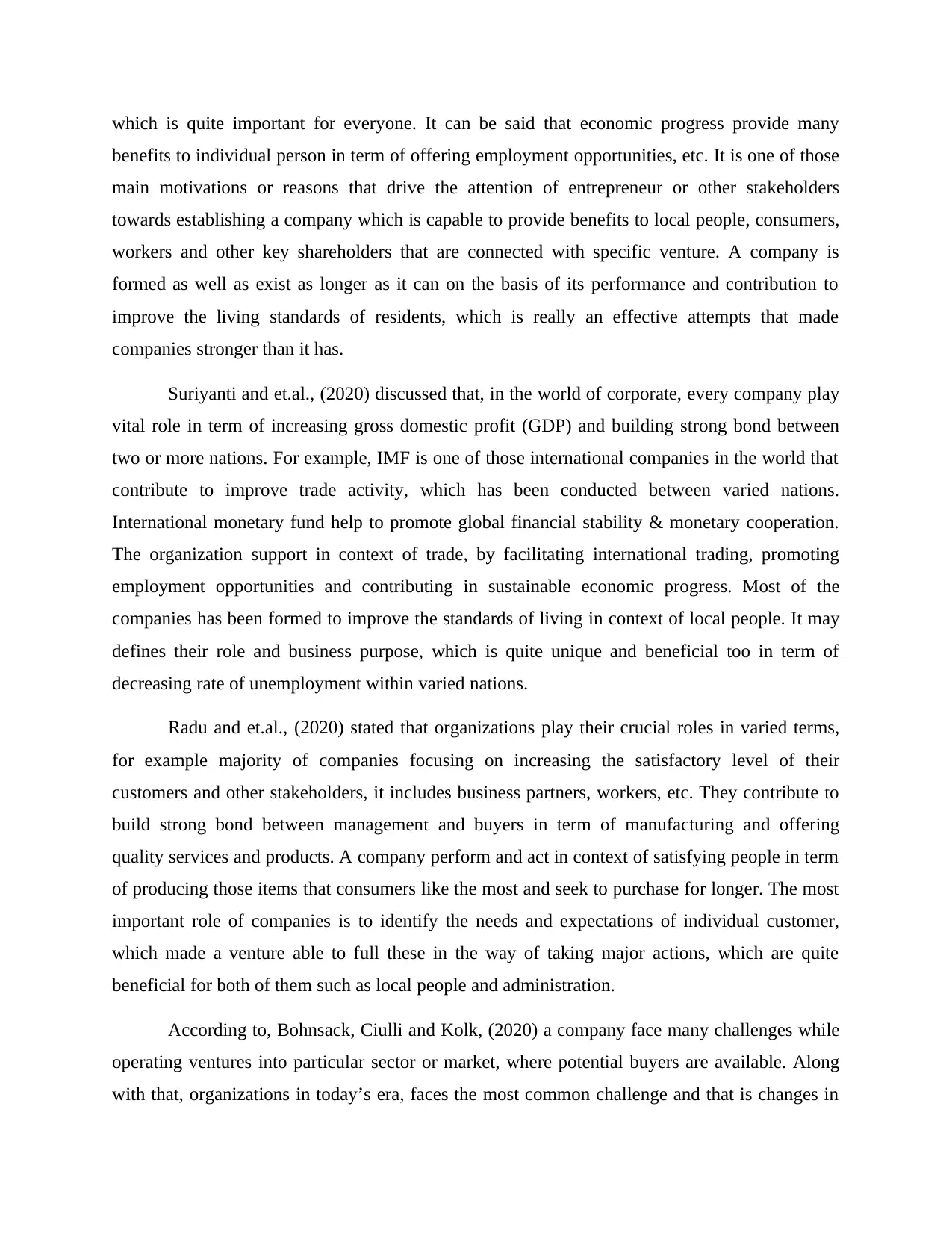
which is quite important for everyone. It can be said that economic progress provide many
benefits to individual person in term of offering employment opportunities, etc. It is one of those
main motivations or reasons that drive the attention of entrepreneur or other stakeholders
towards establishing a company which is capable to provide benefits to local people, consumers,
workers and other key shareholders that are connected with specific venture. A company is
formed as well as exist as longer as it can on the basis of its performance and contribution to
improve the living standards of residents, which is really an effective attempts that made
companies stronger than it has.
Suriyanti and et.al., (2020) discussed that, in the world of corporate, every company play
vital role in term of increasing gross domestic profit (GDP) and building strong bond between
two or more nations. For example, IMF is one of those international companies in the world that
contribute to improve trade activity, which has been conducted between varied nations.
International monetary fund help to promote global financial stability & monetary cooperation.
The organization support in context of trade, by facilitating international trading, promoting
employment opportunities and contributing in sustainable economic progress. Most of the
companies has been formed to improve the standards of living in context of local people. It may
defines their role and business purpose, which is quite unique and beneficial too in term of
decreasing rate of unemployment within varied nations.
Radu and et.al., (2020) stated that organizations play their crucial roles in varied terms,
for example majority of companies focusing on increasing the satisfactory level of their
customers and other stakeholders, it includes business partners, workers, etc. They contribute to
build strong bond between management and buyers in term of manufacturing and offering
quality services and products. A company perform and act in context of satisfying people in term
of producing those items that consumers like the most and seek to purchase for longer. The most
important role of companies is to identify the needs and expectations of individual customer,
which made a venture able to full these in the way of taking major actions, which are quite
beneficial for both of them such as local people and administration.
According to, Bohnsack, Ciulli and Kolk, (2020) a company face many challenges while
operating ventures into particular sector or market, where potential buyers are available. Along
with that, organizations in today’s era, faces the most common challenge and that is changes in
benefits to individual person in term of offering employment opportunities, etc. It is one of those
main motivations or reasons that drive the attention of entrepreneur or other stakeholders
towards establishing a company which is capable to provide benefits to local people, consumers,
workers and other key shareholders that are connected with specific venture. A company is
formed as well as exist as longer as it can on the basis of its performance and contribution to
improve the living standards of residents, which is really an effective attempts that made
companies stronger than it has.
Suriyanti and et.al., (2020) discussed that, in the world of corporate, every company play
vital role in term of increasing gross domestic profit (GDP) and building strong bond between
two or more nations. For example, IMF is one of those international companies in the world that
contribute to improve trade activity, which has been conducted between varied nations.
International monetary fund help to promote global financial stability & monetary cooperation.
The organization support in context of trade, by facilitating international trading, promoting
employment opportunities and contributing in sustainable economic progress. Most of the
companies has been formed to improve the standards of living in context of local people. It may
defines their role and business purpose, which is quite unique and beneficial too in term of
decreasing rate of unemployment within varied nations.
Radu and et.al., (2020) stated that organizations play their crucial roles in varied terms,
for example majority of companies focusing on increasing the satisfactory level of their
customers and other stakeholders, it includes business partners, workers, etc. They contribute to
build strong bond between management and buyers in term of manufacturing and offering
quality services and products. A company perform and act in context of satisfying people in term
of producing those items that consumers like the most and seek to purchase for longer. The most
important role of companies is to identify the needs and expectations of individual customer,
which made a venture able to full these in the way of taking major actions, which are quite
beneficial for both of them such as local people and administration.
According to, Bohnsack, Ciulli and Kolk, (2020) a company face many challenges while
operating ventures into particular sector or market, where potential buyers are available. Along
with that, organizations in today’s era, faces the most common challenge and that is changes in
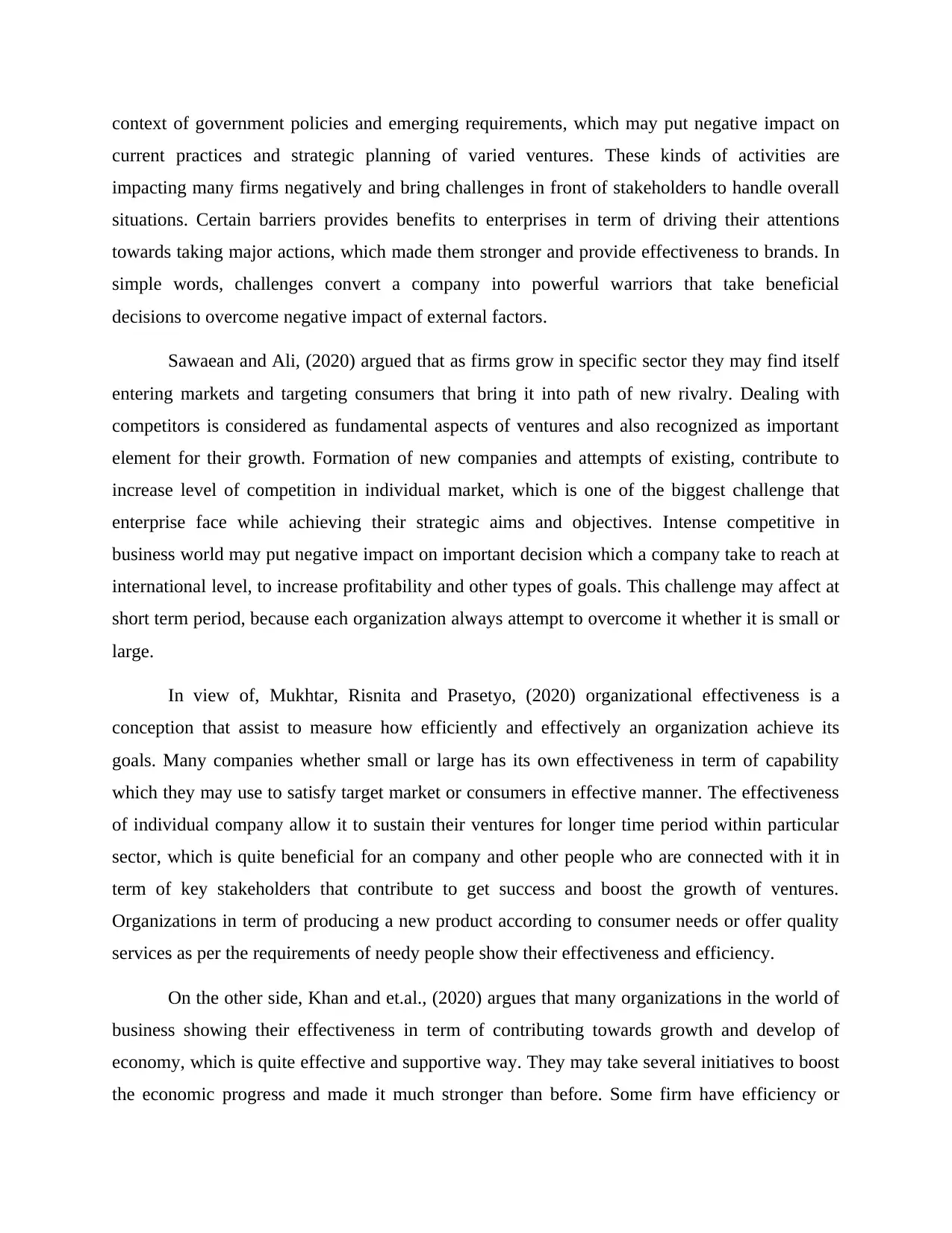
context of government policies and emerging requirements, which may put negative impact on
current practices and strategic planning of varied ventures. These kinds of activities are
impacting many firms negatively and bring challenges in front of stakeholders to handle overall
situations. Certain barriers provides benefits to enterprises in term of driving their attentions
towards taking major actions, which made them stronger and provide effectiveness to brands. In
simple words, challenges convert a company into powerful warriors that take beneficial
decisions to overcome negative impact of external factors.
Sawaean and Ali, (2020) argued that as firms grow in specific sector they may find itself
entering markets and targeting consumers that bring it into path of new rivalry. Dealing with
competitors is considered as fundamental aspects of ventures and also recognized as important
element for their growth. Formation of new companies and attempts of existing, contribute to
increase level of competition in individual market, which is one of the biggest challenge that
enterprise face while achieving their strategic aims and objectives. Intense competitive in
business world may put negative impact on important decision which a company take to reach at
international level, to increase profitability and other types of goals. This challenge may affect at
short term period, because each organization always attempt to overcome it whether it is small or
large.
In view of, Mukhtar, Risnita and Prasetyo, (2020) organizational effectiveness is a
conception that assist to measure how efficiently and effectively an organization achieve its
goals. Many companies whether small or large has its own effectiveness in term of capability
which they may use to satisfy target market or consumers in effective manner. The effectiveness
of individual company allow it to sustain their ventures for longer time period within particular
sector, which is quite beneficial for an company and other people who are connected with it in
term of key stakeholders that contribute to get success and boost the growth of ventures.
Organizations in term of producing a new product according to consumer needs or offer quality
services as per the requirements of needy people show their effectiveness and efficiency.
On the other side, Khan and et.al., (2020) argues that many organizations in the world of
business showing their effectiveness in term of contributing towards growth and develop of
economy, which is quite effective and supportive way. They may take several initiatives to boost
the economic progress and made it much stronger than before. Some firm have efficiency or
current practices and strategic planning of varied ventures. These kinds of activities are
impacting many firms negatively and bring challenges in front of stakeholders to handle overall
situations. Certain barriers provides benefits to enterprises in term of driving their attentions
towards taking major actions, which made them stronger and provide effectiveness to brands. In
simple words, challenges convert a company into powerful warriors that take beneficial
decisions to overcome negative impact of external factors.
Sawaean and Ali, (2020) argued that as firms grow in specific sector they may find itself
entering markets and targeting consumers that bring it into path of new rivalry. Dealing with
competitors is considered as fundamental aspects of ventures and also recognized as important
element for their growth. Formation of new companies and attempts of existing, contribute to
increase level of competition in individual market, which is one of the biggest challenge that
enterprise face while achieving their strategic aims and objectives. Intense competitive in
business world may put negative impact on important decision which a company take to reach at
international level, to increase profitability and other types of goals. This challenge may affect at
short term period, because each organization always attempt to overcome it whether it is small or
large.
In view of, Mukhtar, Risnita and Prasetyo, (2020) organizational effectiveness is a
conception that assist to measure how efficiently and effectively an organization achieve its
goals. Many companies whether small or large has its own effectiveness in term of capability
which they may use to satisfy target market or consumers in effective manner. The effectiveness
of individual company allow it to sustain their ventures for longer time period within particular
sector, which is quite beneficial for an company and other people who are connected with it in
term of key stakeholders that contribute to get success and boost the growth of ventures.
Organizations in term of producing a new product according to consumer needs or offer quality
services as per the requirements of needy people show their effectiveness and efficiency.
On the other side, Khan and et.al., (2020) argues that many organizations in the world of
business showing their effectiveness in term of contributing towards growth and develop of
economy, which is quite effective and supportive way. They may take several initiatives to boost
the economic progress and made it much stronger than before. Some firm have efficiency or
⊘ This is a preview!⊘
Do you want full access?
Subscribe today to unlock all pages.

Trusted by 1+ million students worldwide
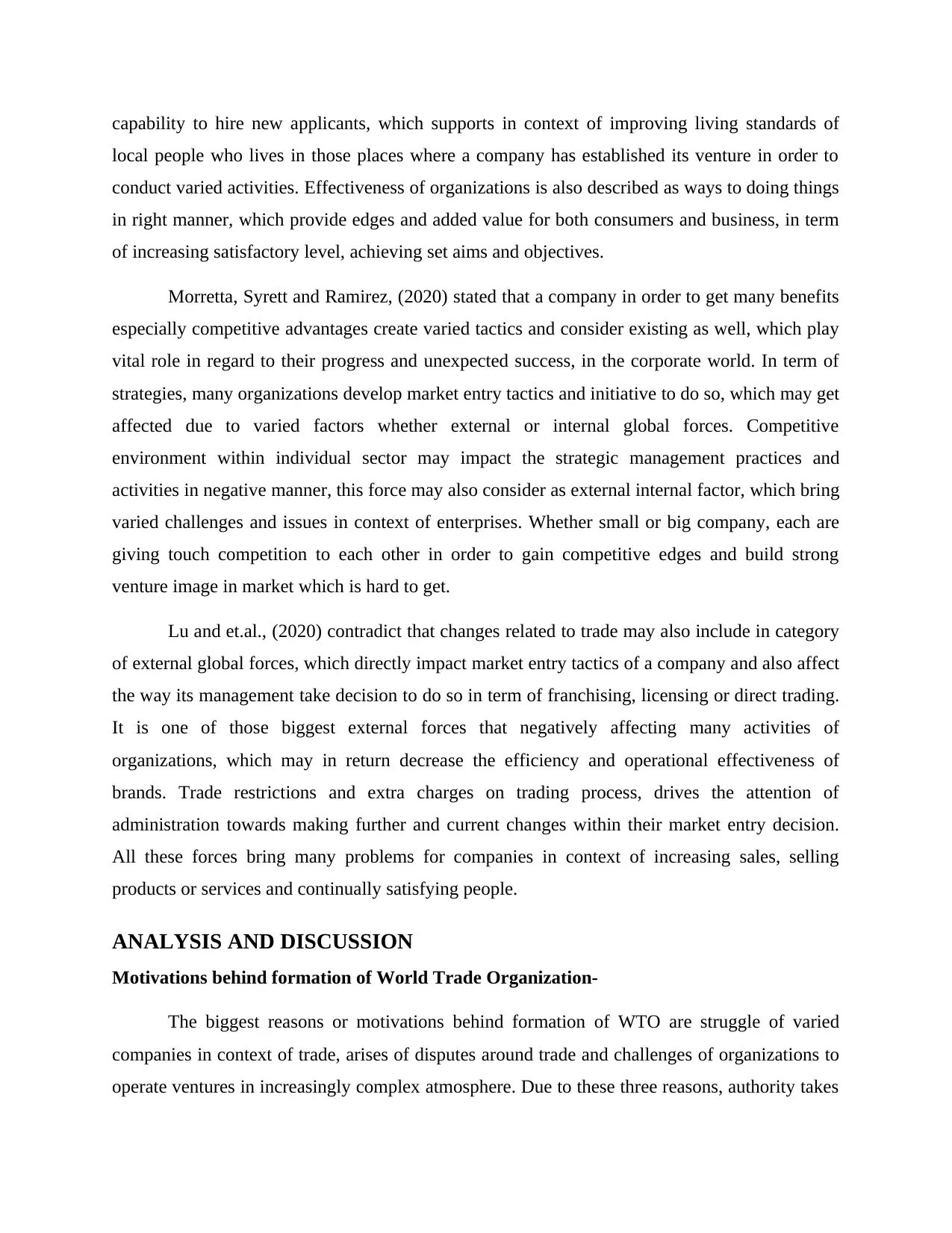
capability to hire new applicants, which supports in context of improving living standards of
local people who lives in those places where a company has established its venture in order to
conduct varied activities. Effectiveness of organizations is also described as ways to doing things
in right manner, which provide edges and added value for both consumers and business, in term
of increasing satisfactory level, achieving set aims and objectives.
Morretta, Syrett and Ramirez, (2020) stated that a company in order to get many benefits
especially competitive advantages create varied tactics and consider existing as well, which play
vital role in regard to their progress and unexpected success, in the corporate world. In term of
strategies, many organizations develop market entry tactics and initiative to do so, which may get
affected due to varied factors whether external or internal global forces. Competitive
environment within individual sector may impact the strategic management practices and
activities in negative manner, this force may also consider as external internal factor, which bring
varied challenges and issues in context of enterprises. Whether small or big company, each are
giving touch competition to each other in order to gain competitive edges and build strong
venture image in market which is hard to get.
Lu and et.al., (2020) contradict that changes related to trade may also include in category
of external global forces, which directly impact market entry tactics of a company and also affect
the way its management take decision to do so in term of franchising, licensing or direct trading.
It is one of those biggest external forces that negatively affecting many activities of
organizations, which may in return decrease the efficiency and operational effectiveness of
brands. Trade restrictions and extra charges on trading process, drives the attention of
administration towards making further and current changes within their market entry decision.
All these forces bring many problems for companies in context of increasing sales, selling
products or services and continually satisfying people.
ANALYSIS AND DISCUSSION
Motivations behind formation of World Trade Organization-
The biggest reasons or motivations behind formation of WTO are struggle of varied
companies in context of trade, arises of disputes around trade and challenges of organizations to
operate ventures in increasingly complex atmosphere. Due to these three reasons, authority takes
local people who lives in those places where a company has established its venture in order to
conduct varied activities. Effectiveness of organizations is also described as ways to doing things
in right manner, which provide edges and added value for both consumers and business, in term
of increasing satisfactory level, achieving set aims and objectives.
Morretta, Syrett and Ramirez, (2020) stated that a company in order to get many benefits
especially competitive advantages create varied tactics and consider existing as well, which play
vital role in regard to their progress and unexpected success, in the corporate world. In term of
strategies, many organizations develop market entry tactics and initiative to do so, which may get
affected due to varied factors whether external or internal global forces. Competitive
environment within individual sector may impact the strategic management practices and
activities in negative manner, this force may also consider as external internal factor, which bring
varied challenges and issues in context of enterprises. Whether small or big company, each are
giving touch competition to each other in order to gain competitive edges and build strong
venture image in market which is hard to get.
Lu and et.al., (2020) contradict that changes related to trade may also include in category
of external global forces, which directly impact market entry tactics of a company and also affect
the way its management take decision to do so in term of franchising, licensing or direct trading.
It is one of those biggest external forces that negatively affecting many activities of
organizations, which may in return decrease the efficiency and operational effectiveness of
brands. Trade restrictions and extra charges on trading process, drives the attention of
administration towards making further and current changes within their market entry decision.
All these forces bring many problems for companies in context of increasing sales, selling
products or services and continually satisfying people.
ANALYSIS AND DISCUSSION
Motivations behind formation of World Trade Organization-
The biggest reasons or motivations behind formation of WTO are struggle of varied
companies in context of trade, arises of disputes around trade and challenges of organizations to
operate ventures in increasingly complex atmosphere. Due to these three reasons, authority takes
Paraphrase This Document
Need a fresh take? Get an instant paraphrase of this document with our AI Paraphraser
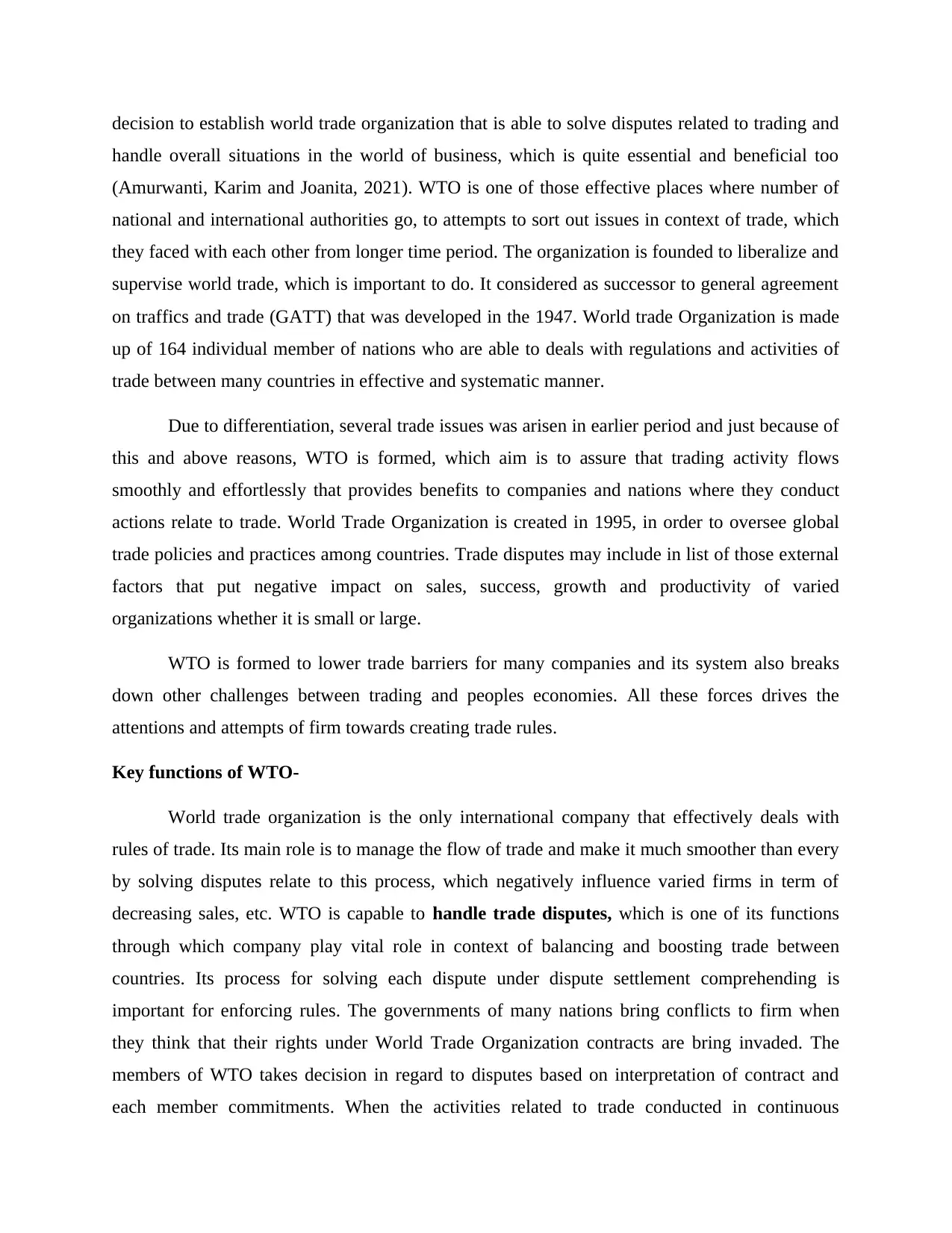
decision to establish world trade organization that is able to solve disputes related to trading and
handle overall situations in the world of business, which is quite essential and beneficial too
(Amurwanti, Karim and Joanita, 2021). WTO is one of those effective places where number of
national and international authorities go, to attempts to sort out issues in context of trade, which
they faced with each other from longer time period. The organization is founded to liberalize and
supervise world trade, which is important to do. It considered as successor to general agreement
on traffics and trade (GATT) that was developed in the 1947. World trade Organization is made
up of 164 individual member of nations who are able to deals with regulations and activities of
trade between many countries in effective and systematic manner.
Due to differentiation, several trade issues was arisen in earlier period and just because of
this and above reasons, WTO is formed, which aim is to assure that trading activity flows
smoothly and effortlessly that provides benefits to companies and nations where they conduct
actions relate to trade. World Trade Organization is created in 1995, in order to oversee global
trade policies and practices among countries. Trade disputes may include in list of those external
factors that put negative impact on sales, success, growth and productivity of varied
organizations whether it is small or large.
WTO is formed to lower trade barriers for many companies and its system also breaks
down other challenges between trading and peoples economies. All these forces drives the
attentions and attempts of firm towards creating trade rules.
Key functions of WTO-
World trade organization is the only international company that effectively deals with
rules of trade. Its main role is to manage the flow of trade and make it much smoother than every
by solving disputes relate to this process, which negatively influence varied firms in term of
decreasing sales, etc. WTO is capable to handle trade disputes, which is one of its functions
through which company play vital role in context of balancing and boosting trade between
countries. Its process for solving each dispute under dispute settlement comprehending is
important for enforcing rules. The governments of many nations bring conflicts to firm when
they think that their rights under World Trade Organization contracts are bring invaded. The
members of WTO takes decision in regard to disputes based on interpretation of contract and
each member commitments. When the activities related to trade conducted in continuous
handle overall situations in the world of business, which is quite essential and beneficial too
(Amurwanti, Karim and Joanita, 2021). WTO is one of those effective places where number of
national and international authorities go, to attempts to sort out issues in context of trade, which
they faced with each other from longer time period. The organization is founded to liberalize and
supervise world trade, which is important to do. It considered as successor to general agreement
on traffics and trade (GATT) that was developed in the 1947. World trade Organization is made
up of 164 individual member of nations who are able to deals with regulations and activities of
trade between many countries in effective and systematic manner.
Due to differentiation, several trade issues was arisen in earlier period and just because of
this and above reasons, WTO is formed, which aim is to assure that trading activity flows
smoothly and effortlessly that provides benefits to companies and nations where they conduct
actions relate to trade. World Trade Organization is created in 1995, in order to oversee global
trade policies and practices among countries. Trade disputes may include in list of those external
factors that put negative impact on sales, success, growth and productivity of varied
organizations whether it is small or large.
WTO is formed to lower trade barriers for many companies and its system also breaks
down other challenges between trading and peoples economies. All these forces drives the
attentions and attempts of firm towards creating trade rules.
Key functions of WTO-
World trade organization is the only international company that effectively deals with
rules of trade. Its main role is to manage the flow of trade and make it much smoother than every
by solving disputes relate to this process, which negatively influence varied firms in term of
decreasing sales, etc. WTO is capable to handle trade disputes, which is one of its functions
through which company play vital role in context of balancing and boosting trade between
countries. Its process for solving each dispute under dispute settlement comprehending is
important for enforcing rules. The governments of many nations bring conflicts to firm when
they think that their rights under World Trade Organization contracts are bring invaded. The
members of WTO takes decision in regard to disputes based on interpretation of contract and
each member commitments. When the activities related to trade conducted in continuous
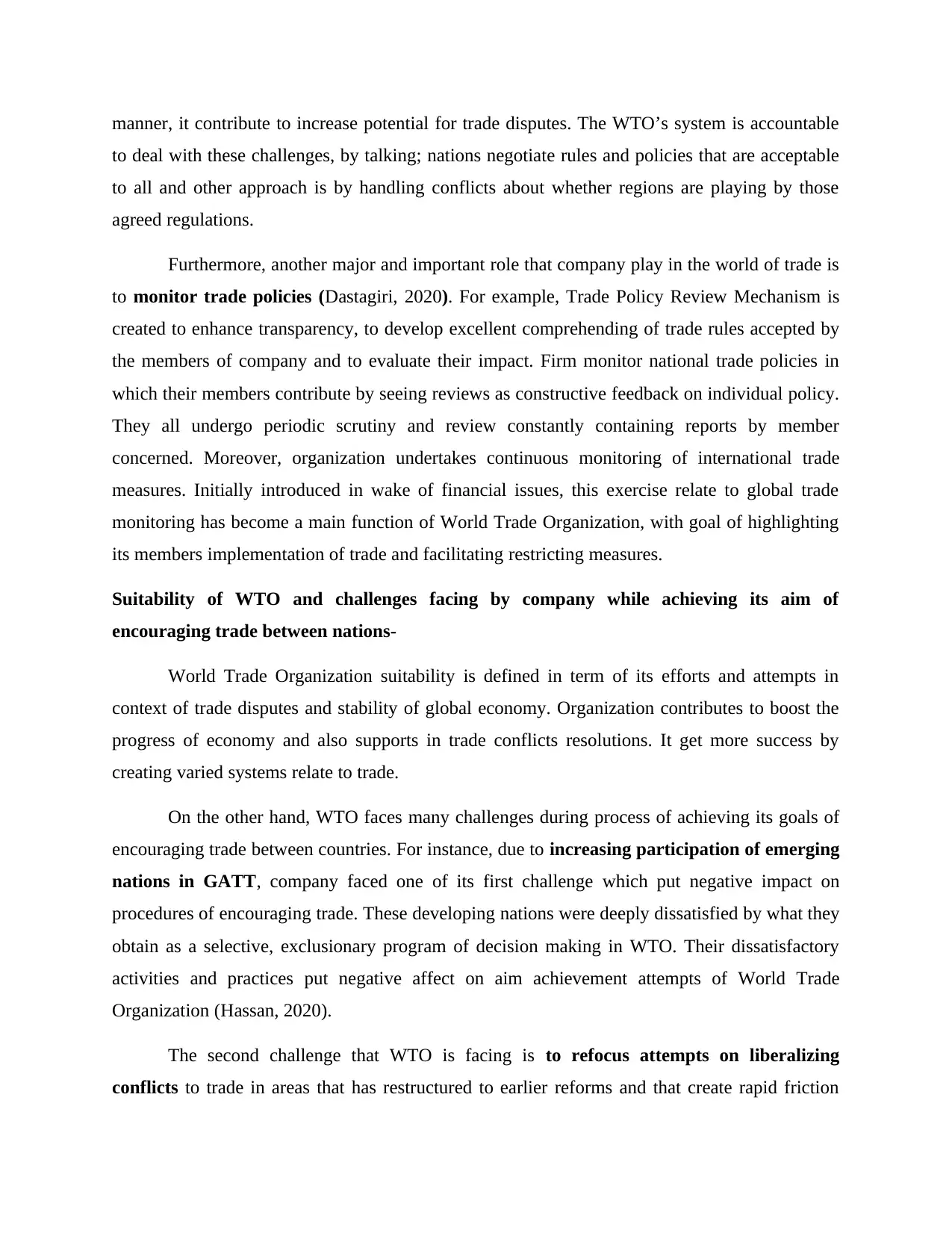
manner, it contribute to increase potential for trade disputes. The WTO’s system is accountable
to deal with these challenges, by talking; nations negotiate rules and policies that are acceptable
to all and other approach is by handling conflicts about whether regions are playing by those
agreed regulations.
Furthermore, another major and important role that company play in the world of trade is
to monitor trade policies (Dastagiri, 2020). For example, Trade Policy Review Mechanism is
created to enhance transparency, to develop excellent comprehending of trade rules accepted by
the members of company and to evaluate their impact. Firm monitor national trade policies in
which their members contribute by seeing reviews as constructive feedback on individual policy.
They all undergo periodic scrutiny and review constantly containing reports by member
concerned. Moreover, organization undertakes continuous monitoring of international trade
measures. Initially introduced in wake of financial issues, this exercise relate to global trade
monitoring has become a main function of World Trade Organization, with goal of highlighting
its members implementation of trade and facilitating restricting measures.
Suitability of WTO and challenges facing by company while achieving its aim of
encouraging trade between nations-
World Trade Organization suitability is defined in term of its efforts and attempts in
context of trade disputes and stability of global economy. Organization contributes to boost the
progress of economy and also supports in trade conflicts resolutions. It get more success by
creating varied systems relate to trade.
On the other hand, WTO faces many challenges during process of achieving its goals of
encouraging trade between countries. For instance, due to increasing participation of emerging
nations in GATT, company faced one of its first challenge which put negative impact on
procedures of encouraging trade. These developing nations were deeply dissatisfied by what they
obtain as a selective, exclusionary program of decision making in WTO. Their dissatisfactory
activities and practices put negative affect on aim achievement attempts of World Trade
Organization (Hassan, 2020).
The second challenge that WTO is facing is to refocus attempts on liberalizing
conflicts to trade in areas that has restructured to earlier reforms and that create rapid friction
to deal with these challenges, by talking; nations negotiate rules and policies that are acceptable
to all and other approach is by handling conflicts about whether regions are playing by those
agreed regulations.
Furthermore, another major and important role that company play in the world of trade is
to monitor trade policies (Dastagiri, 2020). For example, Trade Policy Review Mechanism is
created to enhance transparency, to develop excellent comprehending of trade rules accepted by
the members of company and to evaluate their impact. Firm monitor national trade policies in
which their members contribute by seeing reviews as constructive feedback on individual policy.
They all undergo periodic scrutiny and review constantly containing reports by member
concerned. Moreover, organization undertakes continuous monitoring of international trade
measures. Initially introduced in wake of financial issues, this exercise relate to global trade
monitoring has become a main function of World Trade Organization, with goal of highlighting
its members implementation of trade and facilitating restricting measures.
Suitability of WTO and challenges facing by company while achieving its aim of
encouraging trade between nations-
World Trade Organization suitability is defined in term of its efforts and attempts in
context of trade disputes and stability of global economy. Organization contributes to boost the
progress of economy and also supports in trade conflicts resolutions. It get more success by
creating varied systems relate to trade.
On the other hand, WTO faces many challenges during process of achieving its goals of
encouraging trade between countries. For instance, due to increasing participation of emerging
nations in GATT, company faced one of its first challenge which put negative impact on
procedures of encouraging trade. These developing nations were deeply dissatisfied by what they
obtain as a selective, exclusionary program of decision making in WTO. Their dissatisfactory
activities and practices put negative affect on aim achievement attempts of World Trade
Organization (Hassan, 2020).
The second challenge that WTO is facing is to refocus attempts on liberalizing
conflicts to trade in areas that has restructured to earlier reforms and that create rapid friction
⊘ This is a preview!⊘
Do you want full access?
Subscribe today to unlock all pages.

Trusted by 1+ million students worldwide
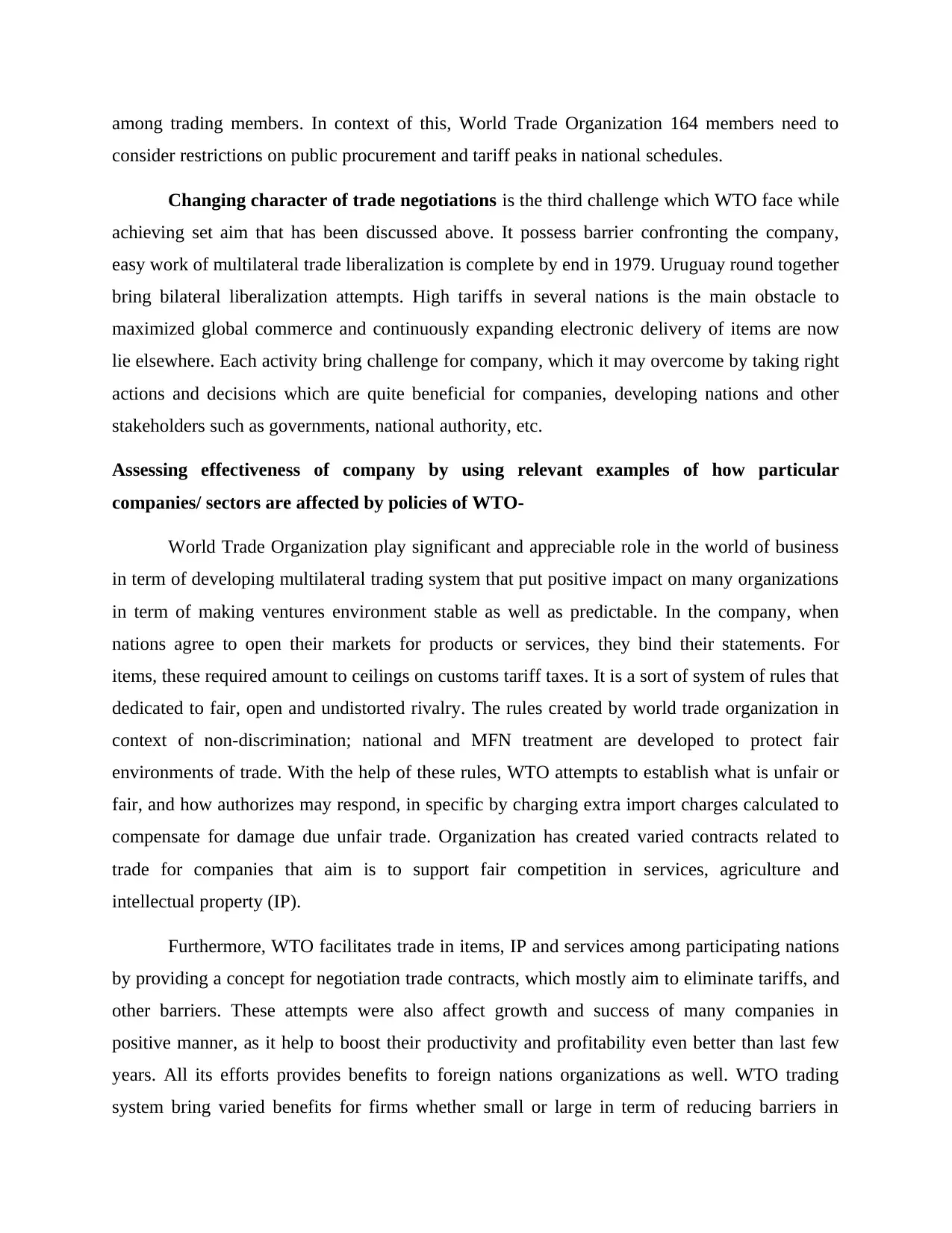
among trading members. In context of this, World Trade Organization 164 members need to
consider restrictions on public procurement and tariff peaks in national schedules.
Changing character of trade negotiations is the third challenge which WTO face while
achieving set aim that has been discussed above. It possess barrier confronting the company,
easy work of multilateral trade liberalization is complete by end in 1979. Uruguay round together
bring bilateral liberalization attempts. High tariffs in several nations is the main obstacle to
maximized global commerce and continuously expanding electronic delivery of items are now
lie elsewhere. Each activity bring challenge for company, which it may overcome by taking right
actions and decisions which are quite beneficial for companies, developing nations and other
stakeholders such as governments, national authority, etc.
Assessing effectiveness of company by using relevant examples of how particular
companies/ sectors are affected by policies of WTO-
World Trade Organization play significant and appreciable role in the world of business
in term of developing multilateral trading system that put positive impact on many organizations
in term of making ventures environment stable as well as predictable. In the company, when
nations agree to open their markets for products or services, they bind their statements. For
items, these required amount to ceilings on customs tariff taxes. It is a sort of system of rules that
dedicated to fair, open and undistorted rivalry. The rules created by world trade organization in
context of non-discrimination; national and MFN treatment are developed to protect fair
environments of trade. With the help of these rules, WTO attempts to establish what is unfair or
fair, and how authorizes may respond, in specific by charging extra import charges calculated to
compensate for damage due unfair trade. Organization has created varied contracts related to
trade for companies that aim is to support fair competition in services, agriculture and
intellectual property (IP).
Furthermore, WTO facilitates trade in items, IP and services among participating nations
by providing a concept for negotiation trade contracts, which mostly aim to eliminate tariffs, and
other barriers. These attempts were also affect growth and success of many companies in
positive manner, as it help to boost their productivity and profitability even better than last few
years. All its efforts provides benefits to foreign nations organizations as well. WTO trading
system bring varied benefits for firms whether small or large in term of reducing barriers in
consider restrictions on public procurement and tariff peaks in national schedules.
Changing character of trade negotiations is the third challenge which WTO face while
achieving set aim that has been discussed above. It possess barrier confronting the company,
easy work of multilateral trade liberalization is complete by end in 1979. Uruguay round together
bring bilateral liberalization attempts. High tariffs in several nations is the main obstacle to
maximized global commerce and continuously expanding electronic delivery of items are now
lie elsewhere. Each activity bring challenge for company, which it may overcome by taking right
actions and decisions which are quite beneficial for companies, developing nations and other
stakeholders such as governments, national authority, etc.
Assessing effectiveness of company by using relevant examples of how particular
companies/ sectors are affected by policies of WTO-
World Trade Organization play significant and appreciable role in the world of business
in term of developing multilateral trading system that put positive impact on many organizations
in term of making ventures environment stable as well as predictable. In the company, when
nations agree to open their markets for products or services, they bind their statements. For
items, these required amount to ceilings on customs tariff taxes. It is a sort of system of rules that
dedicated to fair, open and undistorted rivalry. The rules created by world trade organization in
context of non-discrimination; national and MFN treatment are developed to protect fair
environments of trade. With the help of these rules, WTO attempts to establish what is unfair or
fair, and how authorizes may respond, in specific by charging extra import charges calculated to
compensate for damage due unfair trade. Organization has created varied contracts related to
trade for companies that aim is to support fair competition in services, agriculture and
intellectual property (IP).
Furthermore, WTO facilitates trade in items, IP and services among participating nations
by providing a concept for negotiation trade contracts, which mostly aim to eliminate tariffs, and
other barriers. These attempts were also affect growth and success of many companies in
positive manner, as it help to boost their productivity and profitability even better than last few
years. All its efforts provides benefits to foreign nations organizations as well. WTO trading
system bring varied benefits for firms whether small or large in term of reducing barriers in
Paraphrase This Document
Need a fresh take? Get an instant paraphrase of this document with our AI Paraphraser
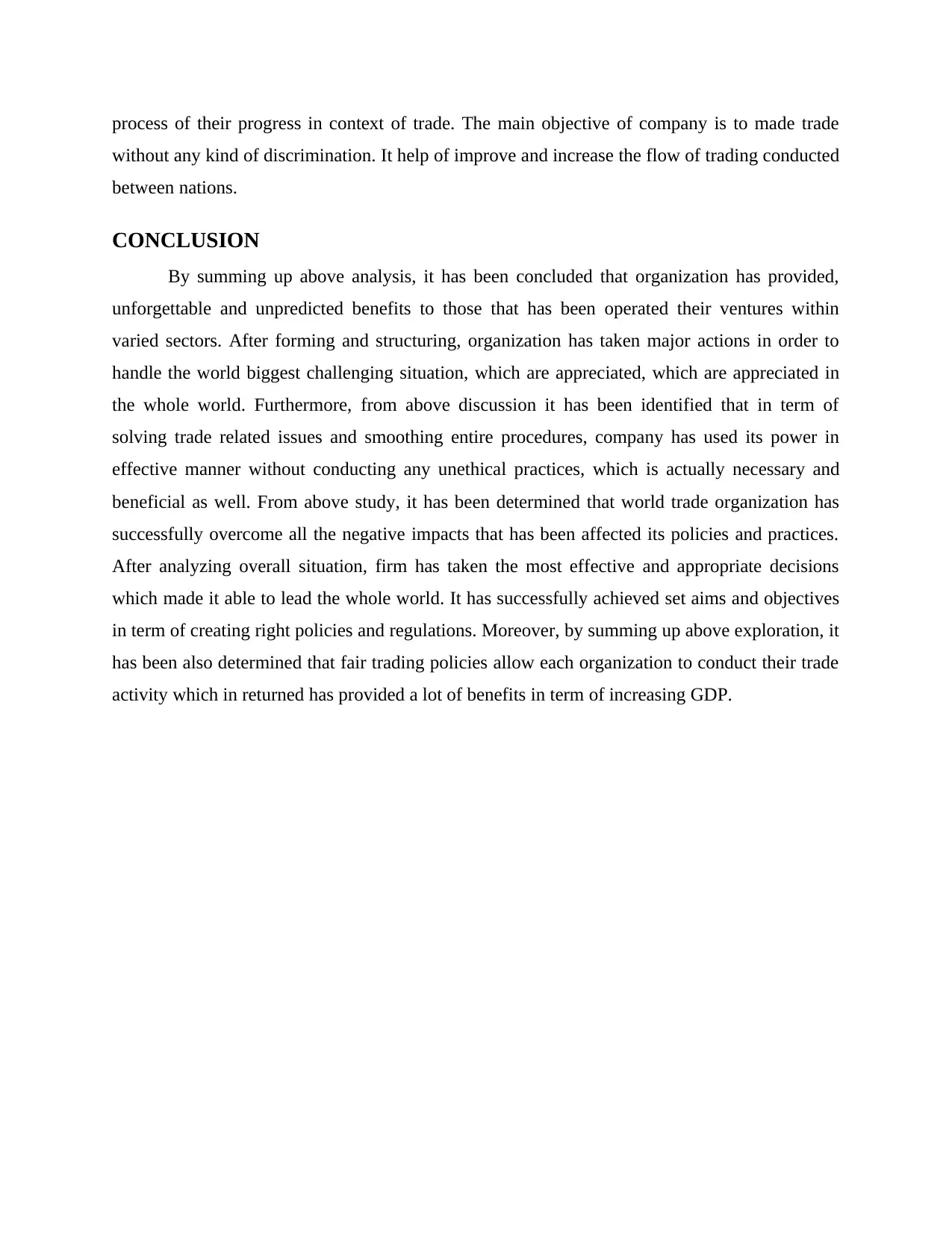
process of their progress in context of trade. The main objective of company is to made trade
without any kind of discrimination. It help of improve and increase the flow of trading conducted
between nations.
CONCLUSION
By summing up above analysis, it has been concluded that organization has provided,
unforgettable and unpredicted benefits to those that has been operated their ventures within
varied sectors. After forming and structuring, organization has taken major actions in order to
handle the world biggest challenging situation, which are appreciated, which are appreciated in
the whole world. Furthermore, from above discussion it has been identified that in term of
solving trade related issues and smoothing entire procedures, company has used its power in
effective manner without conducting any unethical practices, which is actually necessary and
beneficial as well. From above study, it has been determined that world trade organization has
successfully overcome all the negative impacts that has been affected its policies and practices.
After analyzing overall situation, firm has taken the most effective and appropriate decisions
which made it able to lead the whole world. It has successfully achieved set aims and objectives
in term of creating right policies and regulations. Moreover, by summing up above exploration, it
has been also determined that fair trading policies allow each organization to conduct their trade
activity which in returned has provided a lot of benefits in term of increasing GDP.
without any kind of discrimination. It help of improve and increase the flow of trading conducted
between nations.
CONCLUSION
By summing up above analysis, it has been concluded that organization has provided,
unforgettable and unpredicted benefits to those that has been operated their ventures within
varied sectors. After forming and structuring, organization has taken major actions in order to
handle the world biggest challenging situation, which are appreciated, which are appreciated in
the whole world. Furthermore, from above discussion it has been identified that in term of
solving trade related issues and smoothing entire procedures, company has used its power in
effective manner without conducting any unethical practices, which is actually necessary and
beneficial as well. From above study, it has been determined that world trade organization has
successfully overcome all the negative impacts that has been affected its policies and practices.
After analyzing overall situation, firm has taken the most effective and appropriate decisions
which made it able to lead the whole world. It has successfully achieved set aims and objectives
in term of creating right policies and regulations. Moreover, by summing up above exploration, it
has been also determined that fair trading policies allow each organization to conduct their trade
activity which in returned has provided a lot of benefits in term of increasing GDP.
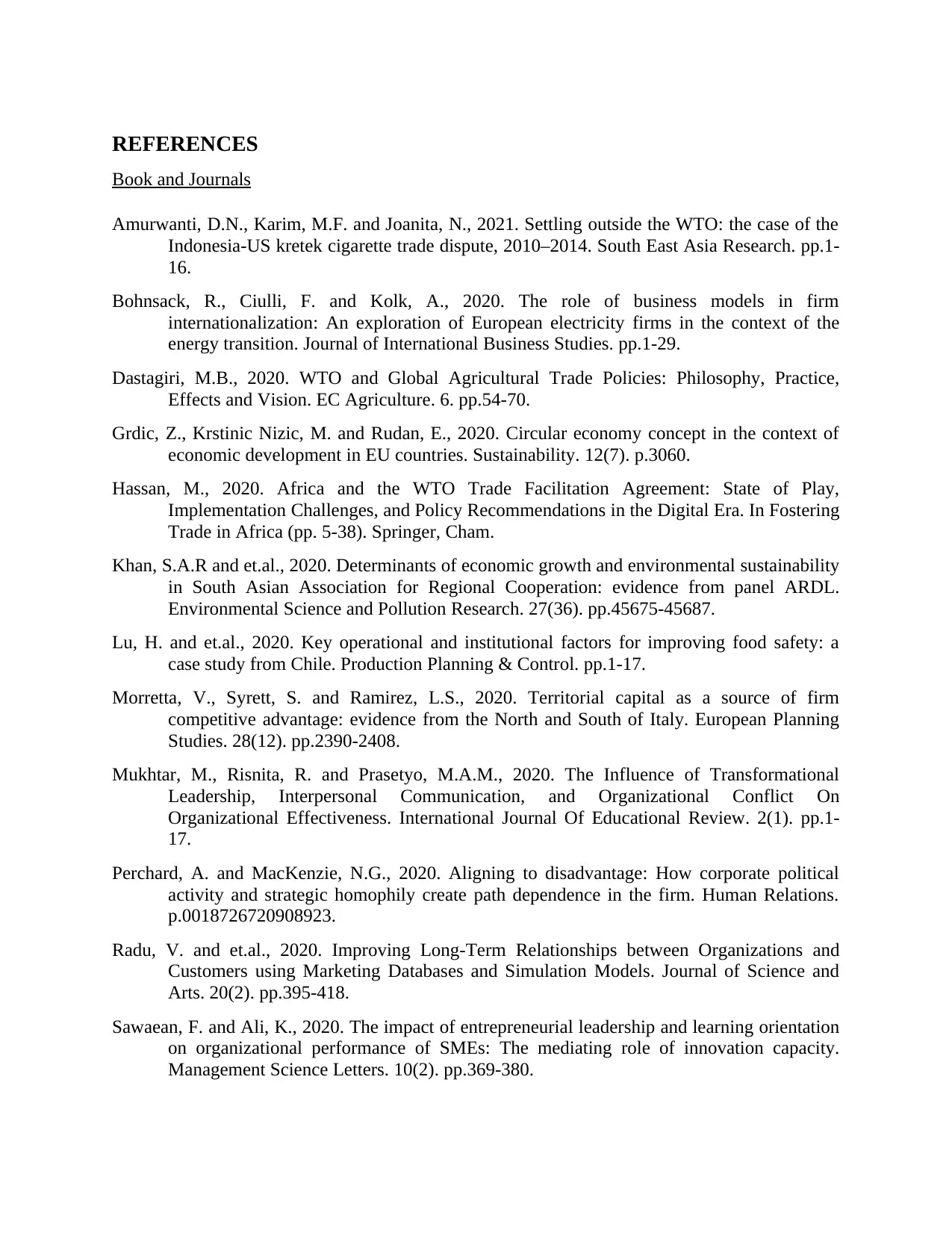
REFERENCES
Book and Journals
Amurwanti, D.N., Karim, M.F. and Joanita, N., 2021. Settling outside the WTO: the case of the
Indonesia-US kretek cigarette trade dispute, 2010–2014. South East Asia Research. pp.1-
16.
Bohnsack, R., Ciulli, F. and Kolk, A., 2020. The role of business models in firm
internationalization: An exploration of European electricity firms in the context of the
energy transition. Journal of International Business Studies. pp.1-29.
Dastagiri, M.B., 2020. WTO and Global Agricultural Trade Policies: Philosophy, Practice,
Effects and Vision. EC Agriculture. 6. pp.54-70.
Grdic, Z., Krstinic Nizic, M. and Rudan, E., 2020. Circular economy concept in the context of
economic development in EU countries. Sustainability. 12(7). p.3060.
Hassan, M., 2020. Africa and the WTO Trade Facilitation Agreement: State of Play,
Implementation Challenges, and Policy Recommendations in the Digital Era. In Fostering
Trade in Africa (pp. 5-38). Springer, Cham.
Khan, S.A.R and et.al., 2020. Determinants of economic growth and environmental sustainability
in South Asian Association for Regional Cooperation: evidence from panel ARDL.
Environmental Science and Pollution Research. 27(36). pp.45675-45687.
Lu, H. and et.al., 2020. Key operational and institutional factors for improving food safety: a
case study from Chile. Production Planning & Control. pp.1-17.
Morretta, V., Syrett, S. and Ramirez, L.S., 2020. Territorial capital as a source of firm
competitive advantage: evidence from the North and South of Italy. European Planning
Studies. 28(12). pp.2390-2408.
Mukhtar, M., Risnita, R. and Prasetyo, M.A.M., 2020. The Influence of Transformational
Leadership, Interpersonal Communication, and Organizational Conflict On
Organizational Effectiveness. International Journal Of Educational Review. 2(1). pp.1-
17.
Perchard, A. and MacKenzie, N.G., 2020. Aligning to disadvantage: How corporate political
activity and strategic homophily create path dependence in the firm. Human Relations.
p.0018726720908923.
Radu, V. and et.al., 2020. Improving Long-Term Relationships between Organizations and
Customers using Marketing Databases and Simulation Models. Journal of Science and
Arts. 20(2). pp.395-418.
Sawaean, F. and Ali, K., 2020. The impact of entrepreneurial leadership and learning orientation
on organizational performance of SMEs: The mediating role of innovation capacity.
Management Science Letters. 10(2). pp.369-380.
Book and Journals
Amurwanti, D.N., Karim, M.F. and Joanita, N., 2021. Settling outside the WTO: the case of the
Indonesia-US kretek cigarette trade dispute, 2010–2014. South East Asia Research. pp.1-
16.
Bohnsack, R., Ciulli, F. and Kolk, A., 2020. The role of business models in firm
internationalization: An exploration of European electricity firms in the context of the
energy transition. Journal of International Business Studies. pp.1-29.
Dastagiri, M.B., 2020. WTO and Global Agricultural Trade Policies: Philosophy, Practice,
Effects and Vision. EC Agriculture. 6. pp.54-70.
Grdic, Z., Krstinic Nizic, M. and Rudan, E., 2020. Circular economy concept in the context of
economic development in EU countries. Sustainability. 12(7). p.3060.
Hassan, M., 2020. Africa and the WTO Trade Facilitation Agreement: State of Play,
Implementation Challenges, and Policy Recommendations in the Digital Era. In Fostering
Trade in Africa (pp. 5-38). Springer, Cham.
Khan, S.A.R and et.al., 2020. Determinants of economic growth and environmental sustainability
in South Asian Association for Regional Cooperation: evidence from panel ARDL.
Environmental Science and Pollution Research. 27(36). pp.45675-45687.
Lu, H. and et.al., 2020. Key operational and institutional factors for improving food safety: a
case study from Chile. Production Planning & Control. pp.1-17.
Morretta, V., Syrett, S. and Ramirez, L.S., 2020. Territorial capital as a source of firm
competitive advantage: evidence from the North and South of Italy. European Planning
Studies. 28(12). pp.2390-2408.
Mukhtar, M., Risnita, R. and Prasetyo, M.A.M., 2020. The Influence of Transformational
Leadership, Interpersonal Communication, and Organizational Conflict On
Organizational Effectiveness. International Journal Of Educational Review. 2(1). pp.1-
17.
Perchard, A. and MacKenzie, N.G., 2020. Aligning to disadvantage: How corporate political
activity and strategic homophily create path dependence in the firm. Human Relations.
p.0018726720908923.
Radu, V. and et.al., 2020. Improving Long-Term Relationships between Organizations and
Customers using Marketing Databases and Simulation Models. Journal of Science and
Arts. 20(2). pp.395-418.
Sawaean, F. and Ali, K., 2020. The impact of entrepreneurial leadership and learning orientation
on organizational performance of SMEs: The mediating role of innovation capacity.
Management Science Letters. 10(2). pp.369-380.
⊘ This is a preview!⊘
Do you want full access?
Subscribe today to unlock all pages.

Trusted by 1+ million students worldwide
1 out of 14
Related Documents
Your All-in-One AI-Powered Toolkit for Academic Success.
+13062052269
info@desklib.com
Available 24*7 on WhatsApp / Email
![[object Object]](/_next/static/media/star-bottom.7253800d.svg)
Unlock your academic potential
Copyright © 2020–2026 A2Z Services. All Rights Reserved. Developed and managed by ZUCOL.





